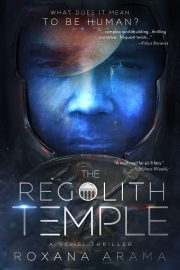Nebula Awards Interview: Aliette de Bodard
by John Ottinger III
 Aliette de Bodard lives and works in Paris, where she has a job as a Computer Engineer. In her spare time, she writes speculative fiction: her series of Aztec noir fantasies, Obsidian and Blood, is published by Angry Robot; and her fiction has appeared in venues such as Asimov’s, Realms of Fantasy and Interzone. She won Writers of the Future, and has been a finalist for the Campbell Award, British Science Fiction Awards, and the Nebula Awards.
Aliette de Bodard lives and works in Paris, where she has a job as a Computer Engineer. In her spare time, she writes speculative fiction: her series of Aztec noir fantasies, Obsidian and Blood, is published by Angry Robot; and her fiction has appeared in venues such as Asimov’s, Realms of Fantasy and Interzone. She won Writers of the Future, and has been a finalist for the Campbell Award, British Science Fiction Awards, and the Nebula Awards.
Visit http://aliettedebodard.com for more information.
First, for those who don’t know, tell us a little about yourself and your writing.
I’m a Computer Engineer living in France, and terminally linguistically confused–I’m a native French speaker writing in English, and to complete the confusion, I’m Franco-Vietnamese. I write mostly because it allows me to indulge my long-standing love of history and mythology: so far, most of my fiction has been either historical fantasy or alternate history. I try to focus on non-Western cultures: I have a particular interest in Ancient Vietnam (obviously), Ancient China (because China gave or forced so much onto Vietnam), and the Aztecs (more on that later).
Why did you choose to write in English, as opposed to your native French?
As said above, I’ve always been a little linguistically confused—my parents insisted early on that my sister and I speak English, and I cut my teeth on several English books from nursery rhymes to picture books. But it wasn’t until the family moved to London that English loomed large: I discovered genre while I was living there. Before, I read a lot of books, but as there was very little genre classification in the children’s section, it wasn’t until I was a teenager in London that I realised that all the books I liked were in the same section of the library; and that I could be all but guaranteed a good read if I picked from said section. So, naturally, when I turned to writing, I did it in the language I was massively reading in; and I haven’t really looked back since.
I notice that cooking is something of a passion of yours. Why do you enjoy it? Do you work what you learn from it into your fiction?
I mostly enjoy cooking because I enjoy eating–it’s always been paramount in my family, both on the French and on the Vietnamese side, to eat well, with fresh products and freshly-cooked meals.
Cooking is also good because it gives me a chance to try my hand at something with immediate results: even a very complicated meal will get eaten within a day or two. By contrast, a project at work can take several years to complete; and a short story several months to write, and several additional months to sell. Cooking is pretty much instant gratification. Plus, of course, it gives me a chance to try out new things.
I don’t really feel I’ve learnt anything that I’ve applied to fiction—though cooking does regularly remind me that good food, like good fiction, can’t really be encompassed by neat recipes, and that a lot of things benefit from improvisation and craft.
Much of your fiction attempts to step outside Western civilization themes and influences. What are stories based on Western civilization missing that needs to be expressed?
It’s not really missing things, in the sense that you can catalogue items that would be missing and methodically add them to our current fiction. It’s more that, to my mind, it lacks diversity, because much of genre is produced in the West by a certain demographic: you can argue, actually, that a lot of it is produced in Western Anglophone countries, and especially the US, by a certain demographic–certainly genre in other countries is overwhelmed by translations from English. That means that genre takes on the mindset, narrative structures and favoured themes of that demographic—that you have an overwhelming majority of straight WASP point-of-view characters living in developed countries (often in the US or Canada), often with very few family ties (parents tend to be absent, or dead), that stories are thought of in terms of protagonist and antagonist, and problems to be fixed; that they need arc, and changes, and (often in fantasy) evil to be defeated through a liberal application of thoughtless violence. You can compare this with similar stories in China—you have movies such as Kung Fu Hustle that are steeped in violence, but have a vey different attitude to it, much less in earnest, and where the point of the story isn’t so much that the villain gets his comeuppance, but that he repents and acknowledges the hero’s superiority.
And I’m not saying that the use of those–mostly US/Western–narratives is bad in and of itself: there are truly wonderful stories that follow this mindset, which I’ve enjoyed reading tremendously. But I think that when you read other literatures, you discover that they take different approaches to fiction—whether it’s through narrative structures (or lack thereof), themes, tropes, …, they’re expressing a different mindset and a different conception of the world. Latin American magical realism, for instance, has a number of preoccupations about regime changes and family life that are very different from US novels. And I think genre fiction could do with more of those, too.
You recently mentioned in a blog post, “On SF and Simplicity,” that you feel there are problems with trying to separate genre from the mainstream? Could you expand on this comment and explain?
It’s a subject I’m conflicted about. On the one hand, separating genre from the mainstream is a very handy tool: I remember that, when I was a child, my library had a single filing system for novels, which lumped together Georgette Heyer, Victor Hugo and Roger Zelazny, which drove me up the wall because I had to spend hours looking through novels that didn’t interest me in order to find something I’d like to read. And I remember how liberating it was when I moved to London and discovered that I could just hit the SF/Fantasy bookshelves and be reasonably sure the book I picked would follow certain parameters.
On the other hand… I can see, too, that my reading habits suffered from this: because I thought that genre was what I wanted, I ended up reading nothing but that, and as time passed, there were fewer and fewer chances that I would pick up authors that didn’t fall within the genre umbrella. The range of things I read basically narrowed down to a trickle; and this was unhealthy because nothing I read ever challenged me strongly
Basically, genre is a very useful guideline for grouping together novels that share certain characteristics, but I think it can also be a trap–what Ursula Le Guin and many others referred to as the ghetto. It tends to create books that are in dialogue with nothing else but genre: and, again, dialogue is a good thing, and a terrific way to create new literature; but it’s not the only one. It also tends to impose a certain monoculture: I’m not saying genre isn’t diverse right now (it is), but there are some things expected of a genre novel today that are purely arbitrary–for instance, a plot with a clearly defined beginning, middle, climax and ending (there are wonderful novels that are very light on plot and structure, such as A Hundred Years of Solitude); or the necessity of a clearly defined speculative element (when a novel doesn’t follow this, it tends to get classified as something other than genre, although in past years genre has got more and more diverse and better at claiming books with speculative elements).
And what do you do with the odd novel that’s not quite genre? The problem of drawing categories is that it’s all too easy to find yourself constrained within your own boundaries.
On that same post, you also comment on the utilitarian approach to telling stories. While you explain your point well there, I was wondering if you had any suggestions of speculative fiction authors that might be outside this narrative approach?
Oh, definitely! A lot of SF is actually not within this mold, but it’s advice that’s very commonly given, and very commonly embraced as well. I can think of several writers that fit the bill: Ian McDonald and Alastair Reynolds both create wonderful futuristic settings that make you feel you could live in them, rather than as if they’d been solely built for plot purposes. Kari Sperring’s Living With Ghosts is very much a paean to a city that you come to know intimately, with characters that all feel like they have their own lives outside of the story. And Maureen McHugh frequently does this–her China Mountain Zhang is a wonderful example of a setting that oozes with cool tidbits, from the kite races to the zen trance used to create architecture.
You have written a trio of novels of an alternate history Aztec civilization. What first drew you to the study of a culture so distant in time and space from your own? What interesting or unique things have you learned by writing stories in this little understood period of time?
I discovered the Aztecs through my Spanish classes, where we read through the conquistadores’ and colonists’ description of them as a bloodthirsty, Barbaric people awaiting the guiding hand of European civilisation to become a Christian nation. It didn’t take much of a genius to figure out that this was self-serving propaganda; and that the main witnesses, the conquistadores themselves, were hardly saints, and hardly believable on the matter of moral judgements. I did one or two presentations on the Aztecs in class, and this got me looking into the civilisation–and I found it fascinating, and not at all barbaric. I guess that’s what got me started: later on, I read a lot of books where the depiction of Aztecs was barely above the level of the conquistadores: whenever someone needed a bloodthirsty people with absolutely no redeeming characteristics whatsoever, they’d reach for some variant on the Aztec culture. And it–annoyed me, I guess? I thought it was cheap, and easy, and did absolutely no justice to a culture that had been repeatedly trampled underfoot. So I started writing my own stories using that culture.
The Aztecs had a completely different mindset on so many things that the story of the Conquest is almost one of tragic misunderstandings (compounded by greed, of course). For instance, they thought pain was sacred and fit for offering up to the gods; and they could never understand why the Spanish would so liberally practise torture to get people to admit either guilt or the hiding places of their riches: to them, pain shouldn’t be sullied with such mundane matters.
They also had a very different conception of war: the Spanish practised an early version of total war, where the goal was to annihilate your adversary by any means possible. The Aztecs and their neighbours saw war as a ritual: the goal was to capture prisoners for sacrifice; and the war stopped when you captured your adversary’s main temple–there was no annihilation of the enemy, and conquered nations tended to keep their kings, and pay tribute to the conqueror. In the very first battles, the Aztecs just didn’t understand why the Spaniards would turn around and start killing everyone after the temple had gone down. They worked that out pretty fast, but they never could quite shake the notion of war as a ritual, and I think that some of the tactics they employed just didn’t account for an enemy that would stoop to anything as long as victory was in the offing.
Your Nebula nominated novelette, “The Jaguar House in Shadow” is part of this series and focuses on themes of betrayal, honor, and friendship. How are these different in Aztec culture from the Western understanding/ideal?
There are many common points with the notions of honour I’m familiar with: the ideal Aztec man follows the advice of his ancestors. He does not lie; he tries to set an example with an impeccable behaviour at all times.
But there are also significant differences. The Aztec culture is dominated and permeated by war: for instance, it’s very telling that most of the animals are viewed as martial. To take just one example, the vulture is a good animal, because it fights fiercely to get its food–there is no stigma associated to it as a scavenger, as in the Christian West. A lot of metaphors have to do with war and with fighting, and warriors are praised above all other social categories.
For all that, their conception of war and honour is both very pragmatic, and very ritualistic: there is, for instance, none of the Western insistence on facing opponents in a fair face-to-face fight. The elite orders, the Jaguar and Eagle Knights, specialised in night-time ambushes that took the enemy by surprise, and this was viewed as absolutely fair and honourable, and within the purview of war.
Honour ties in, too, with the notion of “face and heart”–it’s similar to the Asian concept of “face”, in that your face and heart are tied to other people. A good pupil or a good child, for instance, will lift someone’s face and heart. People linked with you and behaving suitably will enhance your status; and the reverse will be true, too. I imagine it would be the case with friendships, too, though those aren’t subjects about which we know much.
Your stories also step outside the boundaries of standard SF by weaving crime fiction into these histories, leaving the reader wondering if the story is fantasy or crime noir. Why did you choose to blend mystery into your Aztec alternate history?
This is mainly because my favourite other genre is mystery: I grew up on a diet of Agatha Christie and Sherlock Holmes, and graduated to more modern writers such as Elizabeth George and Michael Connelly. I think that there are a lot of things in common between mysteries and SF: a basic SF plot is what I’d call “the revelation”, in which the hero must find out some truth about the world he lives in–and this very often follows the tropes of investigations in mysteries.
Besides the Aztecs, you have written mythologies set in Ancient China and Ancient India. What can stories set in these particular cultures give to Westerners steeped in culture self-love?
I think they bring the same thing that any other culture brings: a sense that there are other things out there, that there are other people who do not have the same values as you, that do not follow the same tropes as you, that do not think as you do. It is precisely what speculative fiction should do–open up one’s mind and foster greater tolerance and awareness that things can be very different, not only out there, but also among humanity.
What projects are you currently working on?
I’m focusing on my alternate history universe of Xuya currently: it’s the same universe as in “The Jaguar House in Shadow”, where China discovered America before the Europeans, and Asian culture remains on the ascendant as people take to space. I’ve completed an SF thriller set in the 21st Century, Foreign Ghosts, which is currently shopped around by my agent. And I’m editing a novella set in the space age, a sort of remake of the Chinese classical novel Dreams of Red Mansions–except it’s in space, with AIs, nanobots and ancestor implants.
•••
 John Ottinger III’s reviews, interviews and articles have appeared in Publishers Weekly, Black Gate, Strange Horizons, Fantasy Magazine, SF Signal, Sacramento Book Review, and at Tor.com. John is an affiliate member of the Science Fiction & Fantasy Writers of America and editor of Grasping for the Wind.
John Ottinger III’s reviews, interviews and articles have appeared in Publishers Weekly, Black Gate, Strange Horizons, Fantasy Magazine, SF Signal, Sacramento Book Review, and at Tor.com. John is an affiliate member of the Science Fiction & Fantasy Writers of America and editor of Grasping for the Wind.


